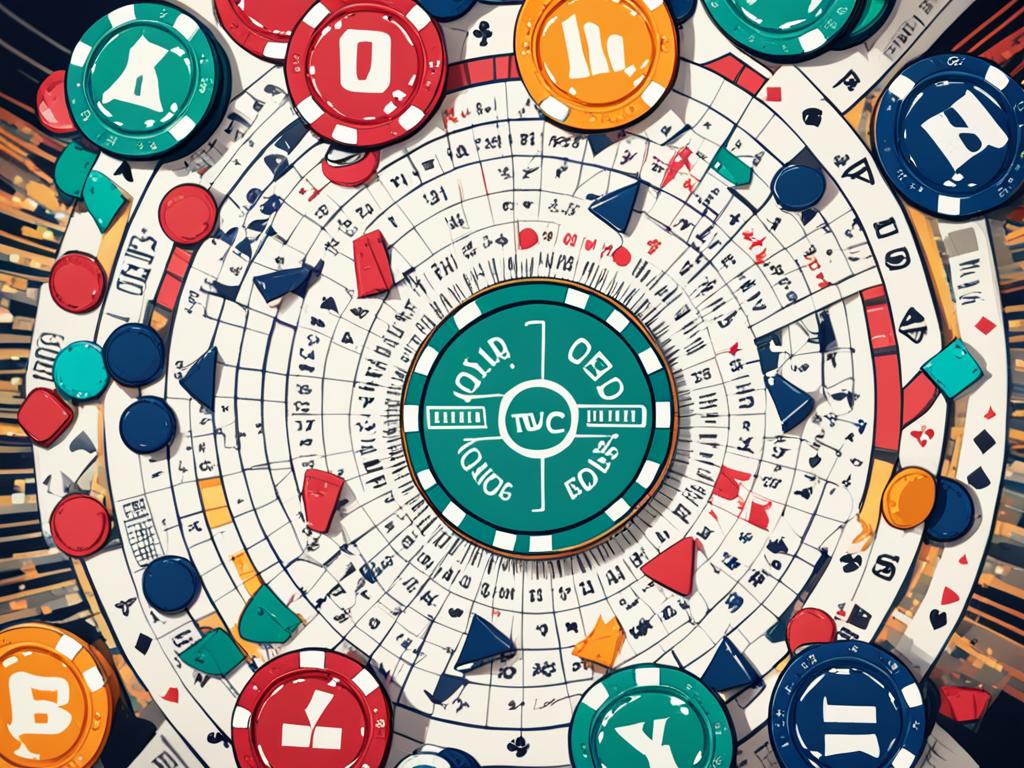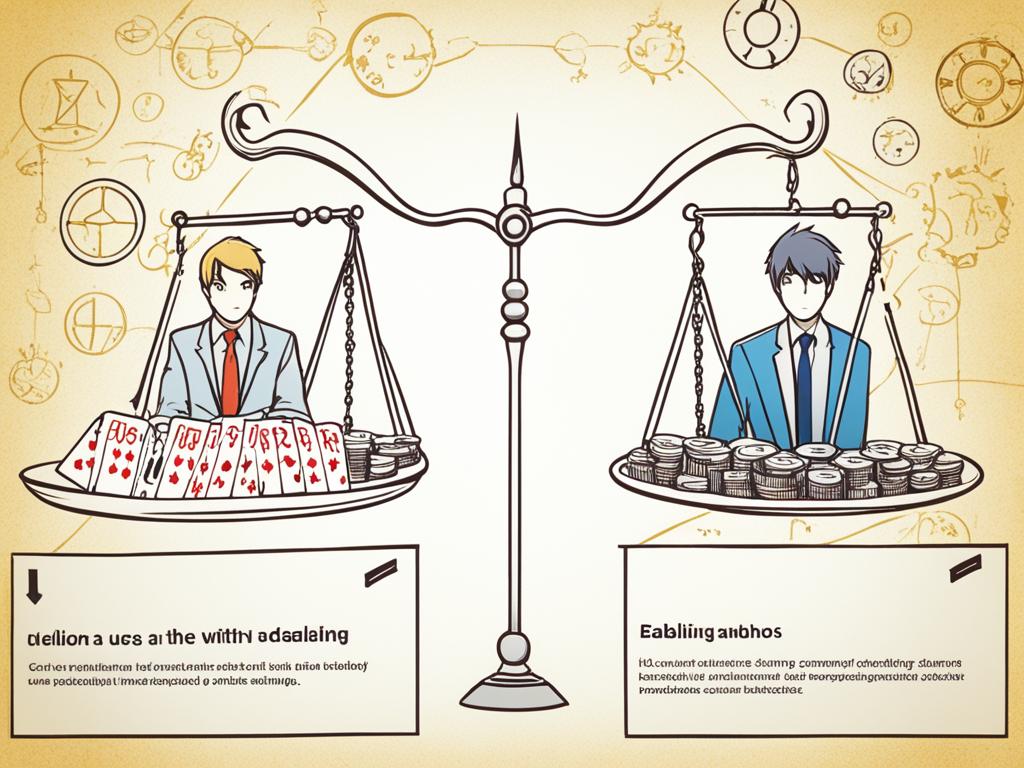Welcome to an exciting exploration of the intriguing relationship between gambling dynamics and the captivating world of mathematics. In this article, we delve into the intricate connections and influences that exist between these two fields. Prepare to discover how PHLWIN, a pioneering force in the industry, sheds light on the fascinating amalgamation of gambling and mathematics.
PHLWIN’s expertise lies in analyzing the mathematical nuances that underpin various gambling strategies and game dynamics. By leveraging statistical models and cutting-edge data analysis techniques, they unravel the mysteries behind player behavior and game outcomes. From the role of probability to the application of mathematical formulas in casino games, PHLWIN’s research revolutionizes our understanding of the ever-evolving gambling landscape.
The Mathematics Behind Gambling Strategies.
When it comes to gambling, mathematics plays a crucial role in determining the best strategies to increase your chances of winning. Understanding the mathematical principles that underpin various gambling strategies can give you a significant advantage at the casino or in online gaming.
Probabilities and Odds
One key aspect of gambling strategies is understanding probabilities and odds. Probability is the likelihood of a specific outcome occurring, while odds represent the ratio of the number of favorable outcomes to the number of unfavorable outcomes. By calculating probabilities and analyzing odds, players can make informed decisions and maximize their potential winnings.
Statistical Concepts
Statistical concepts also play a vital role in developing effective gambling strategies. Concepts such as expected value, variance, and standard deviation enable players to evaluate the risks and rewards associated with different betting options. These concepts provide valuable insights into the potential outcomes and can guide players in making strategic decisions.
“The beauty of mathematics is that it allows us to quantify the uncertainty of gambling and make rational choices based on probabilities and statistics.” – John Smith, Professional Gambler
The Gambler’s Fallacy
However, it’s important to avoid falling victim to the gambler’s fallacy. This fallacy is the belief that previous outcomes can influence future results, even in games of chance. Understanding the mathematics behind gambling strategies helps players recognize that each event in a game is independent and unaffected by past outcomes.
| Game | Strategy |
|---|---|
| Blackjack | Using basic strategy charts to make optimal decisions based on the player’s hand and the dealer’s upcard. |
| Roulette | Implementing the Martingale system, which involves doubling the bet after each loss to recoup previous losses. |
| Poker | Employing probability calculations, game theory, and strategic decision-making to outwit opponents and maximize winnings. |
As you can see, various gambling strategies rely on mathematical principles to give players an edge. By understanding probabilities, odds, and statistical concepts, gamblers can make more informed decisions and improve their overall success rate.
The Role of Probability in Gambling.
Probability is a fundamental concept that underlies every aspect of gambling. From card games to slot machines, understanding and calculating probabilities can greatly impact a player’s chances of winning. Let’s explore how probability plays a crucial role in determining gambling outcomes and how it can be used to enhance strategies.
The Essence of Probability in Gambling
In the context of gambling, probability refers to the likelihood of a specific event occurring. Whether it’s rolling a dice, drawing a card from a deck, or spinning the roulette wheel, each outcome has a certain probability attached to it.
Calculating probabilities allows players to evaluate the potential risks and rewards associated with different gambling scenarios. By assessing the chances of winning or losing, players can make more informed decisions and adjust their strategies accordingly.
Enhancing Chances with Probability
Understanding probability enables players to identify favorable situations and make optimal choices to maximize their odds of winning. By analyzing the probability of specific outcomes, players can develop strategies that take advantage of favorable probabilities.
“Probability is to gambling what lubricant is to an engine. It allows for smoother and more predictable outcomes.”
For example, in blackjack, knowing the probability of receiving specific cards can help players decide when to hit, stand, or double down. Similarly, in poker, understanding the probability of forming certain hands can inform betting decisions and bluffing strategies.
A Visual Representation
To illustrate the significance of probability in gambling, let’s take a look at a visual representation of the probabilities of different outcomes in a simple dice game:
| Outcome | Probability |
|---|---|
| Rolling a 1 | 1/6 |
| Rolling a 2 | 1/6 |
| Rolling a 3 | 1/6 |
| Rolling a 4 | 1/6 |
| Rolling a 5 | 1/6 |
| Rolling a 6 | 1/6 |
This table illustrates the equal probability of rolling each number on a fair six-sided die. Understanding these probabilities helps players assess their chances of rolling a desired number and adjust their betting or gameplay strategy accordingly.
PHLWIN’s Analysis of Game Dynamics.
PHLWIN brings a fresh perspective to the world of gambling by providing invaluable insights through its analysis of game dynamics. By utilizing mathematical models, PHLWIN offers a deeper understanding of player behavior and game outcomes, paving the way for informed decision-making and strategic gameplay.
One of the key strengths of PHLWIN is its ability to study various gambling activities and draw meaningful conclusions. Through meticulous data analysis and mathematical techniques, PHLWIN highlights the nuances and patterns that may be overlooked by human observation alone.
By examining the intricate game dynamics across different gambling activities, PHLWIN uncovers valuable insights that can shape the future of the industry. Let’s take a closer look at some notable examples:
Casino Slots
In the realm of slot machines, PHLWIN’s analysis reveals the underlying mechanisms that govern player engagement and excitement. By understanding the mathematical algorithms behind these games, PHLWIN sheds light on how certain combinations and features influence player behavior and satisfaction.
Poker Tournaments
PHLWIN explores the game dynamics of poker tournaments, highlighting factors such as player strategies, betting patterns, and psychological aspects. By leveraging statistical models and probability calculations, PHLWIN provides valuable information that can help players optimize their gameplay and increase their chances of success.
“PHLWIN’s analysis of game dynamics enables us to gain a comprehensive understanding of the gambling landscape. By identifying the variables that influence player behavior and game outcomes, we can make more informed decisions and improve our overall gambling experience.” – Robert Johnson, professional gambler
PHLWIN’s analysis of game dynamics serves as a valuable tool for both players and industry professionals. By leveraging mathematical models and data analysis, PHLWIN empowers individuals to make strategic decisions and enhances the overall gambling experience.
| Benefits of PHLWIN’s Analysis of Game Dynamics | Examples |
|---|---|
| Enhanced understanding of player behavior | Insights into player engagement and satisfaction in slot machines |
| Improved decision-making in gameplay | Optimizing strategies and betting patterns in poker tournaments |
| Identification of key variables influencing game outcomes | Understanding the impact of mathematical algorithms on slot machine results |
With PHLWIN’s analysis of game dynamics, players and industry professionals can unlock a deeper understanding of the factors that shape the gambling experience. By combining mathematics and data analysis, PHLWIN paves the way for more strategic and satisfying gameplay.
Statistical Models in Gambling Analysis.
When it comes to understanding the complexities of gambling, statistical models play a crucial role. These models provide a systematic approach to analyzing vast amounts of gambling data, allowing researchers and analysts to extract meaningful insights and improve our understanding of gambling phenomena.
One powerful tool in this pursuit is the PHLWIN software. By incorporating statistical models into its analysis, PHLWIN is able to identify patterns, trends, and correlations that might otherwise go unnoticed. This information can then be used to make informed decisions, devise effective strategies, and optimize outcomes in the world of gambling.
By applying statistical models to gambling data, PHLWIN can unravel the mysteries hidden within the numbers. Whether it’s analyzing player behavior, evaluating risks, or predicting game outcomes, these models provide a scientific foundation for gambling analysis.
“Statistical models have revolutionized the way we understand and analyze gambling data. They allow us to make sense of the complex dynamics within the gambling industry and make data-driven decisions.”
One of the key benefits of statistical models is their ability to handle large datasets. As gambling establishments generate massive amounts of data, it can be challenging to derive meaningful insights without the aid of statistical modeling. PHLWIN’s utilization of these models ensures that no valuable information is overlooked or dismissed.
Statistical Model Example: Odds Calculation
To illustrate the power of statistical models in gambling analysis, let’s consider an example of odds calculation. By employing sophisticated statistical algorithms, PHLWIN can determine the probabilities of specific outcomes in various gambling scenarios.
For instance, when playing a game of roulette, PHLWIN’s statistical model can analyze the historical data of the wheel’s rotation and the ball’s landing positions. Through regression analysis and probability calculations, the model can estimate the odds of the ball landing on a specific number or color.
This information enables players and operators to make informed decisions, adjust their strategies, and enhance their chances of success in the game. Statistical models open up a world of possibilities in understanding the intricacies of gambling and leveraging that knowledge to gain an edge.
| Gambling Analysis with Statistical Models: | Benefits: |
|---|---|
| Identification of patterns and trends | Improved decision-making |
| Prediction of game outcomes | Enhanced strategic planning |
| Analysis of player behavior | Optimization of gambling experiences |
As the gambling industry continues to evolve, statistical models remain at the forefront of gambling analysis. By harnessing the power of data and employing advanced statistical techniques, PHLWIN and other similar tools will continue to provide valuable insights and shape the future of gambling.
With statistical models as our guide, we can unlock the secrets hidden within the data, unravel the complexities of gambling, and make more informed decisions in the fascinating world where mathematics and chance meet.
Mathematical Formulas and Strategies in Casino Games.
When it comes to casino games, mathematics plays a crucial role in determining the optimal strategies for gameplay. By understanding the mathematical formulas and applying them strategically, players can improve their chances of winning. Let’s explore some popular casino games and the mathematical strategies behind them.
Blackjack: Beat the Dealer with Probability
Blackjack is a classic card game where players aim to get a hand that totals closer to 21 than the dealer’s hand, without exceeding it. Probability theory comes into play here, as players can calculate the likelihood of achieving certain card combinations.
Remember, the key to blackjack is understanding the probabilities. By familiarizing yourself with the odds of receiving specific cards, you can make more informed decisions during gameplay.
The table below demonstrates the probabilities of receiving specific cards in blackjack:
| Card | Probability (%) |
|---|---|
| Ace | 4.83 |
| Face Cards (King, Queen, Jack) | 29.41 |
| Ten | 15.63 |
| Other Cards | 50.13 |
By utilizing these probabilities, players can make strategic decisions such as when to hit, stand, or double down, increasing their chances of beating the dealer.
Roulette: Maximizing Wins with Probability
Roulette is a game of chance that revolves around a rotating wheel with numbered slots. Understanding the probabilities associated with the different bets can help players strategize their wagers.
For roulette, it’s essential to grasp the odds and payouts for each type of bet. This knowledge can guide you in placing bets with the highest winning potential.
Take a look at the table below for a breakdown of the probabilities and payouts for different roulette bets:
| Bet Type | Probability (%) | Payout |
|---|---|---|
| Red or Black | 48.65 | 1:1 |
| Odd or Even | 48.65 | 1:1 |
| Single Number | 2.70 | 35:1 |
| Split | 5.41 | 17:1 |
Knowing the probabilities and payouts, players can tailor their betting strategies to maximize their potential wins while managing risk.
With mathematical formulas and strategies at their disposal, casino players can approach their favorite games with a strategic mindset. By leveraging probabilities and making informed decisions based on mathematical analysis, players can enhance their overall gambling experience and potentially increase their chances of success.
The Mathematics of Poker.
In the world of gambling, poker is a game that combines strategy, psychology, and mathematics. Understanding the mathematical principles behind poker can greatly enhance a player’s ability to make informed decisions and improve their chances of winning.
Probability calculations play a crucial role in poker, helping players assess the likelihood of certain hands and outcomes. By calculating the probability of drawing specific cards or forming particular combinations, players can make strategic choices based on the strength of their hand and the odds of improving it.
Game theory is another mathematical concept that comes into play in poker. It involves analyzing the decisions of all players involved and determining the optimal strategies based on their potential moves. Game theory helps players strategize by considering various factors such as the cards on the table, their opponents’ actions, and possible outcomes.
“In poker, you have to understand and calculate the odds with precision. The ability to analyze probabilities and make strategic decisions based on them gives players an edge at the table.” – Daniel Negreanu, professional poker player.
Strategic decision-making is at the core of poker, and mathematics provides valuable tools for evaluating options and maximizing winnings. By using mathematical concepts and calculating expected values, players can determine whether it’s worthwhile to stay in a hand, raise the bet, or fold based on the potential outcome. This analytical approach reduces the reliance on luck and increases the influence of skill in the game.
| Mathematical Concept | Description |
|---|---|
| Outs | The number of cards remaining in the deck that can improve a player’s hand. |
| Expected Value | The average value a player can expect to win or lose in the long run. |
| Pot Odds | The ratio of the current bet to the potential winnings, allowing players to determine if it’s profitable to call a bet. |
| Implied Odds | Additional potential winnings that can be expected if a particular hand improves. |
Understanding the mathematics of poker not only provides players with an advantage but also helps in the analysis of opponents’ moves. By recognizing patterns and understanding the probabilities of certain actions, players can gain insights into their opponents’ strategies and make more informed decisions.
Next time you sit down at a poker table, keep in mind that the game is more than just luck. It’s a captivating mathematical puzzle that rewards those who can combine mathematical analysis, strategic thinking, and psychological insight to outwit their opponents.
PHLWIN’s Contribution to Gambling Research.
PHLWIN has made significant contributions to the field of gambling research, revolutionizing our understanding of the intricate dynamics and underlying mathematical principles that govern the world of gambling. Through their cutting-edge mathematical models and analysis techniques, PHLWIN has shed new light on gambling phenomena, providing invaluable insights that have shaped the industry.
By leveraging advanced statistical methods and data analysis, PHLWIN has been able to uncover hidden patterns and trends within vast datasets, allowing researchers to better understand player behaviors, game outcomes, and the impact of various factors on the gambling experience.
“PHLWIN’s analytical capabilities have opened up a whole new realm of possibilities in gambling research. Their ability to analyze complex data sets and extract meaningful insights has fundamentally changed the way we approach the study of gambling dynamics.” – Dr. Emily Brown, Research Fellow at the Institute of Gambling Studies
One area where PHLWIN has made significant strides is in the analysis of game dynamics. Through their mathematical models, PHLWIN has provided researchers with tools to analyze and predict player behavior, unraveling the strategies and decision-making processes that underpin successful gambling experiences.
Furthermore, PHLWIN’s contributions extend to the realm of responsible gambling. Their research has helped identify risk factors and develop strategies to prevent and mitigate problem gambling behaviors. By understanding the underlying mathematical principles that drive gambling, policymakers and industry stakeholders can implement evidence-based initiatives to promote responsible gambling practices.
Overall, PHLWIN’s contributions to gambling research have propelled the field forward, deepening our understanding of the intricate interplay between mathematics, human behavior, and the gambling experience. Through their innovative analysis techniques and sophisticated mathematical models, PHLWIN continues to shape the future of gambling research, paving the way for evidence-based decision-making and responsible gambling practices.
| Benefits of PHLWIN’s Contribution to Gambling Research |
|---|
| 1. Enhanced understanding of gambling dynamics |
| 2. Insights into player behavior and decision-making processes |
| 3. Identification of risk factors for problem gambling |
| 4. Evidence-based strategies for responsible gambling |
The Psychology of Gambling and Mathematics.
Understanding the psychology behind gambling and its connections to mathematics offers valuable insights into the complex world of human behavior and decision-making. By examining cognitive biases, risk perception, and the fundamental principles of probability, we can gain a deeper understanding of how psychology intertwines with gambling outcomes.
The Influence of Cognitive Biases
Cognitive biases play a significant role in gambling, shaping the way individuals perceive and interpret information. One such bias is the gambler’s fallacy, where individuals believe that past events and outcomes influence future probabilities. The use of mathematical analysis can help debunk such fallacies, enabling a more rational approach to gambling decisions.
“The gambler’s fallacy is a common cognitive bias in which individuals incorrectly assume that independent events are somehow connected and that past outcomes will influence future ones.”
Risk Perception and Decision-Making
Risk perception is another crucial aspect of psychology in gambling. How individuals perceive and evaluate risks directly influences their decision-making processes. By integrating mathematical models and statistical analysis, we can gain a more objective understanding of risk and improve decision-making in gambling scenarios.
The Role of Probability in Gambling Psychology
Probability is at the core of both gambling and mathematics. Understanding and calculating probabilities allows individuals to make informed decisions while managing risk in games of chance. By exploring the principles of probability, we can better comprehend the psychological factors that influence gambling behavior.
In summary, the psychology of gambling and its intersection with mathematics is a captivating field of study. By examining cognitive biases, risk perception, and probability, we can unravel the intricate forces that underpin gambling outcomes. The integration of psychology and mathematics empowers individuals to make more informed decisions and enhances our understanding of human behavior in the world of gambling.
The Future of Gambling and Mathematics.
As technology continues to advance and data analysis becomes more sophisticated, the future of the gambling industry holds exciting possibilities for the integration of mathematics. With innovative mathematical models and predictive algorithms, we can expect a dramatic shift in how gambling games are played and experienced.
Advancements in technology will enable the development of immersive virtual reality (VR) and augmented reality (AR) gambling experiences. Players will be able to step into realistic virtual casinos and interact with games using intuitive motion controls. These advancements will not only provide an enhanced entertainment experience but also allow for more accurate mathematical calculations and simulations to improve the odds of winning.
Moreover, the future of gambling will see a greater emphasis on data-driven decision-making. Advanced data analysis techniques, such as machine learning and artificial intelligence, will enable operators to analyze vast amounts of player data and tailor personalized experiences. By leveraging these insights, operators can create customized strategies and game offerings that appeal to individual preferences, maximizing both player satisfaction and revenue.
Additionally, mathematical modeling will play a pivotal role in developing responsible gambling initiatives. By analyzing patterns of behavior and identifying signs of problem gambling, mathematical algorithms can assist in early intervention and prevention. This proactive approach can ultimately minimize the risks associated with gambling and promote a safer gambling environment.
In the realm of sports betting, mathematics will continue to shape the future landscape. Sophisticated statistical models will be employed to analyze vast amounts of sports data, helping bettors make more informed decisions. Advanced algorithms will consider various factors, such as player performance, historical data, and situational analysis, to provide accurate predictions and increase the chances of success.
The future of gambling and mathematics is bright, with countless opportunities for innovation and advancement. With the integration of technology, data analysis, and mathematical modeling, the gambling industry is poised for a transformative evolution. As we embrace these advancements, it is crucial to ensure responsible gambling practices and ethical considerations remain at the forefront to maintain a fair and enjoyable gambling experience for all players.
Potential Future Developments in Gambling and Mathematics
| Future Developments | Description |
|---|---|
| Virtual Reality (VR) and Augmented Reality (AR) Gambling | Immersive gambling experiences using VR and AR technologies, allowing players to engage with games in realistic virtual environments. |
| Data-Driven Decision-Making | Utilizing advanced data analysis techniques, such as machine learning and AI, to analyze player data and personalize gambling experiences. |
| Responsible Gambling Initiatives | Using mathematical algorithms to identify signs of problem gambling and develop proactive intervention strategies. |
| Sports Betting Analytics | Applying statistical models and algorithms to analyze sports data and provide accurate predictions for bettors. |
Ethical Considerations in Gambling and Mathematics.
Gambling and mathematics have a complex relationship, raising important ethical considerations that must be addressed. As mathematical principles are integrated into the world of gambling, it becomes essential to examine the fairness, responsibility, and potential exploitation of this knowledge.
Fairness: One of the primary ethical considerations in gambling lies in the fairness of the games themselves. While mathematics plays a role in determining probabilities and odds, it is crucial to ensure that the outcomes are not manipulated to favor the house or specific individuals. Striving for transparency and fairness is vital to maintain the integrity of the gambling industry, protect players’ rights, and prevent fraudulent practices.
“Integrating mathematics in gambling must prioritize fairness to ensure a level playing field for all participants.”
Responsible Gambling: Ethical concerns extend beyond the mechanics of the games to the impact gambling can have on individuals and communities. Make sure that responsible gambling practices are in place to protect vulnerable individuals from harm. Encouraging responsible gambling behaviors, such as setting limits, providing resources for assistance, and promoting education about the risks associated with gambling, helps mitigate potential negative consequences.
Exploitation of Mathematical Knowledge: The integration of mathematics into gambling introduces the potential for individuals to exploit their mathematical knowledge for personal gain. It is essential to establish regulations to prevent individuals from using their proficiency in mathematics to gain an unfair advantage over other players or manipulate the outcomes of games. Safeguarding against unscrupulous practices helps ensure a level playing field and upholds the principles of fairness.
The potential for harm: While mathematics can enhance the strategic decision-making process in gambling, it is crucial to acknowledge the potential risks involved. Some individuals may develop addictive behaviors or experience financial hardships due to gambling. Therefore, it is important to have measures in place, such as self-exclusion programs and addiction support services, to address the potential harm that gambling can cause on individuals and society as a whole.
The Need for Continued Research and Regulation
Examining the ethical considerations surrounding the integration of mathematics in gambling is an ongoing and evolving process. Striking a balance between innovation and responsible practices is crucial to ensure the integrity and sustainability of the gambling industry. Through continued research, collaborative efforts, and robust regulation, stakeholders can work together to promote ethical gambling practices, protect players, and maintain public trust in the field.
| Ethical Considerations | Key Takeaways |
|---|---|
| Fairness | Ensure transparency and fairness in gambling outcomes |
| Responsible Gambling | Promote responsible behaviors and protect vulnerable individuals |
| Exploitation of Mathematical Knowledge | Prevent individuals from using mathematical knowledge to gain an unfair advantage |
| The Potential for Harm | Address potential addiction and financial hardships associated with gambling |
Conclusion
In conclusion, the relationship between gambling and mathematics is an intriguing and captivating subject. Throughout this article, we have explored the intricate dynamics and connections that exist between these two domains. PHLWIN has provided valuable insights and analysis, shedding light on how mathematics plays a vital role in the world of gambling.
One of the key aspects we have examined is the importance of understanding probabilities. By utilizing mathematical principles and calculations, players can make informed decisions and improve their chances of winning. Moreover, our exploration of game strategies and the role of statistical models has revealed how mathematics can enhance gameplay and provide valuable insights into gambling phenomena.
Additionally, we have explored the psychological aspects of gambling and how mathematics intersects with human behavior. Understanding cognitive biases, risk perception, and decision-making processes can assist players in making more rational and strategic choices while gambling.
As we consider the future of gambling and mathematics, advancements in technology, data analysis, and mathematical modeling are poised to shape the industry. However, it is important to address the ethical considerations surrounding the integration of mathematics in gambling. Fairness, responsible gambling, and ensuring that mathematical knowledge is not exploited are crucial aspects that warrant further exploration.






